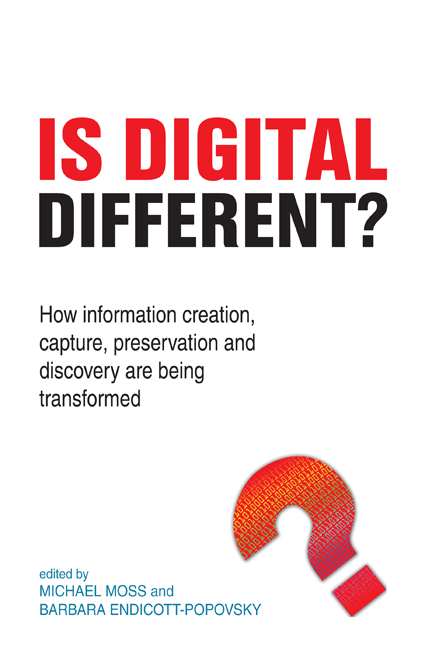 Is Digital Different?
Is Digital Different? Book contents
- Frontmatter
- Contents
- Contributors
- Introduction and acknowledgements
- 1 What is the same and what is different
- 2 Finding stuff
- 3 RDF, the Semantic Web, Jordan, Jordan and Jordan
- 4 Crowdsourcing
- 5 Pathways to integrating technical, legal and economic considerations in the design, development and deployment of trusted IM systems
- 6 Finding archived records in a digital age
- 7 Security: managing online risk
- 8 Rights and the commons: navigating the boundary between public and private knowledge spaces
- 9 From the Library of Alexandria to the Google Campus: has the digital changed the way we do research?
- Index
5 - Pathways to integrating technical, legal and economic considerations in the design, development and deployment of trusted IM systems
Published online by Cambridge University Press: 08 June 2018
- Frontmatter
- Contents
- Contributors
- Introduction and acknowledgements
- 1 What is the same and what is different
- 2 Finding stuff
- 3 RDF, the Semantic Web, Jordan, Jordan and Jordan
- 4 Crowdsourcing
- 5 Pathways to integrating technical, legal and economic considerations in the design, development and deployment of trusted IM systems
- 6 Finding archived records in a digital age
- 7 Security: managing online risk
- 8 Rights and the commons: navigating the boundary between public and private knowledge spaces
- 9 From the Library of Alexandria to the Google Campus: has the digital changed the way we do research?
- Index
Summary
Introduction: the IM problem and solution landscape
This chapter suggests that networked IM (information management) challenges of security, privacy and risk/liability are just symptoms of a single condition. That single condition is the lack of agreement by stakeholders. This condition is acute, since networked IM systems (the ‘cloud’) operate as distributed, socio-technical systems, i.e. those that simultaneously serve and are constituted from both people and technology acting in concert. However, IM systems are typically designed, developed and deployed as if they were systems composed solely of technology and as if the problems with their operation could be fixed by technology alone. This ignores the people operating IM solutions, causing their destabilization.
Technology solutions are a natural focus because their performance is more readily measurable than that of people and institutions. Unfortunately, like the man who is looking for his lost wristwatch only under the streetlight because that is where the light is better, we are unlikely to find the solutions we are looking for just because they are more readily apparent. The actions of individuals and institutions in networked IM systems, not the technology, are the source of most current security, privacy and risk/liability concerns, and focus on technology alone does not adequately address the system operational variables that arise from human behaviours engaged in by IM system stakeholders. That blind spot is revealed through consideration of the fact that the vast majority of data breaches are the result of human, rather than technological, factors. Technological fixes alone are insufficient for improving socio-technical systems where human negligence and intentional misconduct are the chief causes of lack of system integrity. We all need socio-technical processes to evolve socio-technical systems. Markets and other formal and informal rule-making processes generate enforceable ‘agreements’ among people that also reduce risk and offer an additional solution space for networked IM.
The big strides in improving security and privacy, and the introduction of measures to mitigate liability will allow stakeholders to develop their own performance standards which can be measured meaningfully and provide feedback that can be used to police both technological and human failure in systems.
- Type
- Chapter
- Information
- Is Digital Different?How information creation, capture, preservation and discovery are being transformed, pp. 95 - 128Publisher: FacetPrint publication year: 2015


